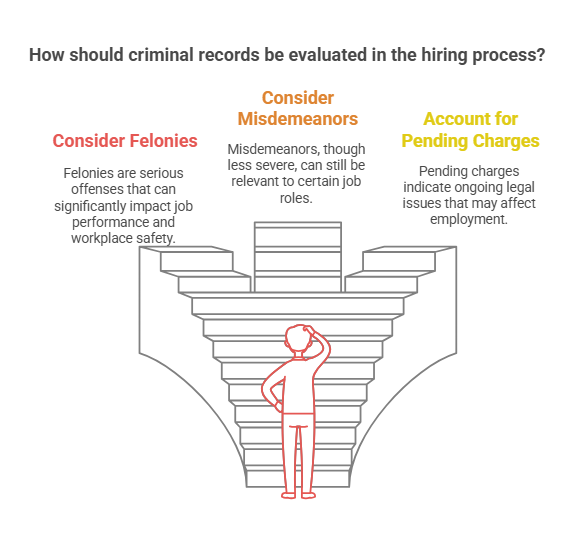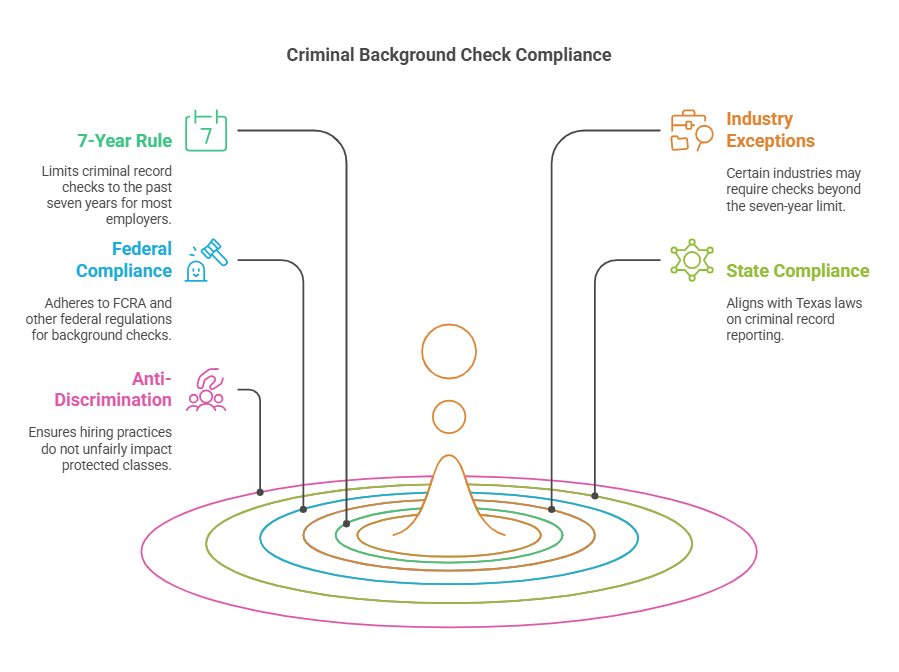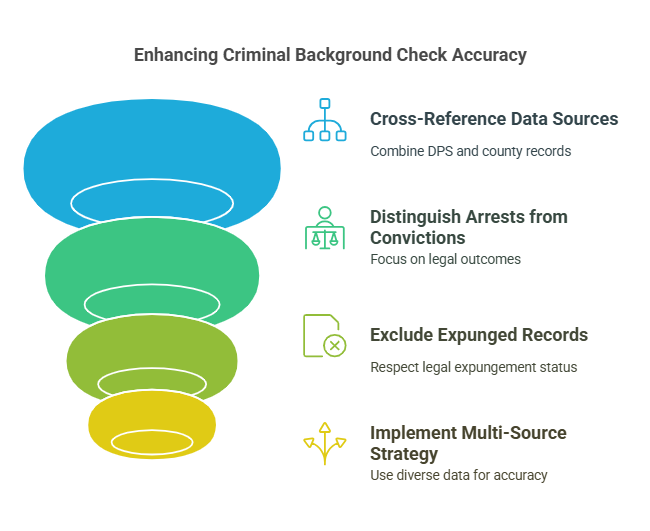Criminal record searches are a critical component for employers in Texas aiming to ensure workplace safety and comply with legal standards. With a notable percentage of employers performing background checks, understanding the nuances of Texas regulations and best practices is essential. This guide delves into the necessary steps, examines the legal context, and provides authoritative data to streamline the process of conducting criminal record searches in Texas.
Key Takeaways
- Use multiple sources, like DPS and county courts, for comprehensive criminal background checks in Texas.
- Ensure your HR team is trained on laws like the Fair Credit Reporting Act to maintain compliance.
- Focus on records that are relevant and recent to the job for fair decision-making.
- Partner with reputable screening companies to help access accurate records efficiently.
- Stay updated on laws like the Texas Regulatory Consistency Act to avoid legal issues.
Introduction
Conducting criminal record searches is more than a checkbox task for Texas employers. It's a foundational step in ensuring a safe work environment and maintaining compliance with legal requirements.
In Texas, the specifics matter. Employers need to navigate unique state laws alongside federal regulations. Understanding these rules can mean the difference between a smooth hiring process and potential legal pitfalls.
Knowing why these searches matter can prevent future issues. They deter workplace crime and protect organizational reputation. Moreover, they help avoid liabilities tied to negligent hiring lawsuits.
What about the Texas laws you need to know? Employers must consider nuances like the Texas Business Code §20.05 and the state's particular stance on reporting limitations and timing of inquiries.
Thinking broadly, how does Texas differ from other states in this regard? Unique privacy rules and strict background check protocols make Texas stand out.
Approach this task with diligence. Whether you're running a small business or a large corporation, understanding both the importance and complexity of criminal record searches in Texas is vital for effective hiring practices. Are you reevaluating your current background check approach yet?
Understanding Texas Criminal Records
A criminal record search in Texas is not always straightforward. It requires knowing where to look and understanding the type of information available. Let's break it down for you.
Sources of Criminal Data
In Texas, criminal records are found in several places, each serving a unique role:
- Texas Department of Public Safety (DPS): The DPS manages the Computerized Criminal History (CCH) system. This is your starting point for state-level data. It includes arrests, dispositions, and other reportable events.
- County Courts: Local courts maintain records of felonies and misdemeanors. These records are vital. State databases can miss updates, so county-level checks help ensure completeness.
- FBI National Database: For security roles, the FBI database is necessary. It provides a broader scope, crucial for positions requiring federal clearance.
What’s Included in a Texas Criminal Record?
In Texas, criminal records can encompass a range of information crucial for employers. These records typically include details of felonies and misdemeanors. Felonies are serious offenses like theft or assault, while misdemeanors cover less severe acts but can still be relevant.

Additionally, criminal records may list pending charges. A pending charge means someone has been formally accused of a crime, but the case hasn't reached a conclusion. Knowing about pending charges can inform your hiring decision process.
Arrests without convictions create another layer. An arrest record indicates someone was detained or questioned by law enforcement. However, it doesn’t reflect a conviction. Distinguishing between arrests and convictions is important to ensure fair hiring practices.
Consider the role of each piece of data in your decision-making. Why is it there, and how does it relate to the position you're filling? Defining which offenses matter for the role can guide you through the complexities.
When you view a criminal record, you're not just seeing a list of offenses. You're examining part of a person's history that may influence their job performance and workplace interactions. By focusing on relevant crimes and timeframes, you can make informed hiring choices.
Is your evaluation process set to handle these records effectively?
Legal Framework for Employers
Conducting criminal record searches as an employer in Texas involves understanding several legal frameworks. This section focuses on key regulations you need to know to stay compliant.
The 7-Year Rule
The 7-Year Rule is a pivotal aspect of conducting criminal record searches in Texas. This rule limits how far back an employer can look into a candidate's criminal history. Generally, employers can only consider records from the past seven years unless certain exceptions apply.
The main purpose of this rule is to protect applicants from being judged based on old or irrelevant offenses. It also aligns with the Fair Credit Reporting Act (FCRA), which imposes similar restrictions.
However, there are exceptions.
Industries like finance and healthcare often require more thorough checks. In these cases, employers might be allowed to review records beyond the typical seven-year period. Federal laws or state-specific regulations might grant such exceptions, especially for positions involving high trust or security.
For example, healthcare employers may need to conduct deeper searches to comply with specific federal guidelines.
Understanding these exceptions is crucial. Employers must ensure they're acting within legal boundaries while making hiring decisions, particularly given Texas' unique restrictions on reporting non-conviction records.
Ask yourself: Are you taking the necessary steps to adhere to these regulations?
If not, revisit your background check policies. Align them with state and federal laws to avoid potential issues. Balancing thorough vetting with respect for applicants' privacy rights is essential in the hiring process.

Federal and State Compliance
When conducting criminal record searches, compliance with both federal and state laws is essential to safeguard your business and respect applicant rights.
- FCRA Compliance: The Fair Credit Reporting Act (FCRA) is fundamental. Before conducting a background check, you need to get written consent from the applicant. If adverse action arises based on the report, provide the individual with a copy and a summary of their rights. This transparency allows them to dispute any inaccuracies.
- Texas Business Code §20.05: This section limits the reporting of criminal records. In Texas, consumer reporting agencies can't report arrests that didn't result in a conviction, cases over seven years old, or sealed and expunged records. Ensure your procedures align with these restrictions to avoid penalties.
- Texas Regulatory Consistency Act (2023): This Act standardizes the timing of criminal history inquiries. You need to delay these checks until after a conditional offer is made. This law aims to promote fair hiring practices by ensuring that qualifications are considered before criminal history.
Navigating these requirements helps you uphold the rights of applicants while maintaining a legally sound hiring process. Are your current practices consistent with these legal standards?
Anti-Discrimination Laws
When conducting criminal background checks, you must tread carefully to avoid unintentional discrimination. The Equal Employment Opportunity Commission (EEOC) has guidelines designed to prevent disparate impact claims, which can arise if your employment practices disproportionately affect members of a protected class.
The EEOC advises that you assess criminal records individually rather than applying blanket bans. Consider the nature, gravity, and recency of an offense. For example, an old minor theft might not be relevant when hiring for a position in software development.
Another key element is the relationship between the offense and the job's duties. Ask yourself: Does the crime directly relate to the job responsibilities? This framework helps ensure you're making fair decisions based on the role's specific needs.
Train your HR team to recognize the difference between legitimate safety concerns and discriminatory practices. Erroneous assumptions can lead to costly legal battles.
Being transparent with applicants can also help. Inform candidates at the outset about your background check policy. This openness can deter applicants with potentially harmful records and attract those who appreciate honest business practices.
Ultimately, balancing safety, compliance, and fairness benefits everyone involved. Your challenge lies in crafting policies that respect legal obligations while supporting informed hiring decisions.
Step-by-Step Guide to Conducting a Criminal Record Search
Develop a Background Check Policy
Creating a background check policy is essential for conducting thorough and lawful criminal record searches. Start by clearly defining roles within your organization. Decide who will handle the checks and who will interpret the results. This avoids confusion and ensures consistency.
Establish standardized procedures. Outline what steps to take when a background check is required. This includes how to obtain consent from candidates and which databases to use. Consistency here ensures all candidates are treated the same, minimizing legal risks.
Determine the criteria for assessing the relevance of criminal history. Not all offenses impact a candidate's ability to perform a job. Specify which types of crimes are disqualifying for your specific positions. For example, a theft conviction may be more relevant for a cashier position than for a remote job.
Consider the nature and gravity of the offense. Was it a one-time incident or part of a pattern? How much time has passed since the offense? Evaluate whether the individual has demonstrated rehabilitation. These factors can help balance fairness with safety.
Regularly review and update your policy. Laws change, and so do best practices. Revisit your policy annually to ensure compliance with new legislation and industry standards. This prevents outdated practices from causing legal headaches.
Think about the overall impact of your policy. Does it align with your company’s values and culture? A well-crafted policy reflects your commitment to workplace safety and fairness. It assures candidates that their history will be evaluated thoughtfully and justly.
Use Authoritative Databases
When conducting criminal record searches in Texas, tapping into authoritative databases is crucial. Start with the Texas DPS Public Site. While fee-based, it offers a reliable source for name-based checks, which are essential for capturing a broad view of a candidate's criminal history. However, this should not be the only step in your process.
Fingerprint checks provide a higher level of accuracy. These ensure you are verifying the right individual's records. This method captures details that might be missed with name-based checks alone and is especially important for roles that demand stringent background verification.
County courts are your next stop. They house local criminal case information. County-level verification is a necessary step to confirm data from the DPS site or when a discrepancy arises. An employer focused solely on state databases may miss localized details crucial for decision-making.
Partnering with reputable screeners can streamline this process. Not all third-party screeners are equal. Make sure they have comprehensive coverage across Texas to avoid regional gaps in data collection. A screener that understands local laws and practices ensures compliance and accuracy in your criminal record searches.
By relying on these authoritative sources and procedures, you protect your business from potential oversights and legal woes. Are your current methods providing comprehensive and accurate results? If not, consider integrating these steps into your background check policy.
Partner with Reputable Screeners
Selecting the right partner for criminal background checks is crucial for your business. A reputable screening company ensures compliance with legal requirements and provides comprehensive coverage across all necessary jurisdictions.
Start by looking for firms accredited by the Professional Background Screening Association (PBSA). This accreditation guarantees the company meets high industry standards and follows best practices.
Consider the screening company's coverage areas. Some vendors excel in specific regions while others offer nationwide services. Make sure your screener can access detailed data from all relevant Texas counties.
Evaluate their compliance track record. Confirm they adhere to the Fair Credit Reporting Act (FCRA) and Texas-specific regulations. This minimizes the risk of legal issues arising from non-compliance.
Ask about their data sources and verification methods. A reliable screener should use direct sources, like the Texas DPS, for accurate and up-to-date information. They should also provide clear procedures for verifying data at the county level.
Check references and reviews. Past client experiences can give you insights into the company's reliability and customer service. Reach out to other businesses in your industry for recommendations.
Finally, ensure your chosen vendor provides easy-to-understand reports. You need clear, actionable information that helps you make informed hiring decisions.
Partnering with the right screening company saves you time, reduces risk, and keeps your hiring process smooth. Is your current provider meeting all these criteria?
Common Pitfalls & How to Avoid Them
Incomplete Records
Incomplete records are common in criminal background checks. They can lead to hiring risks.
Start by cross-referencing county-level data. Why? Texas Department of Public Safety (DPS) records sometimes miss updates. Counties hold important recent updates.
Consider an example. A company relied solely on DPS data. They missed a recent county-level conviction. The oversight nearly led to a problematic hire.
To avoid such pitfalls, use a multi-source strategy. Combine DPS checks with local court records. Check both felonies and misdemeanors at the county level.
Ensure the screener verifies current statuses. This cross-referencing fills gaps often present in state systems. Practical accuracy comes from this diligence.

Misinterpreting Arrests vs. Convictions
Arrests do not equal guilt. This distinction matters when reviewing candidates' criminal history. An arrest indicates a person was detained or charged. A conviction, however, results from a legal court process that finds the individual guilty.
Consider this: An applicant might have been arrested several times but never convicted. What should that mean for your hiring decision? Focusing only on convictions can help avoid unfair bias. Remember the difference impacts both compliance and fairness.
Employers must handle arrest records with care. The EEOC warns against using arrest records alone as a hiring decision basis. They suggest considering the nature of the crime, the time since it occurred, and its relevance to the job.
Take the case of a Texas firm that rejected an applicant based solely on multiple arrests, which led to an EEOC investigation citing possible discrimination. The final ruling emphasized the need to assess each case individually.
Are your current practices fair and legally sound? Reexamine them regularly. Make sure your hiring decisions withstand scrutiny and reflect thoughtful consideration. This approach keeps you compliant and promotes workplace equity.
Overlooking Expunged Records
Expunged records often slip through the cracks during criminal background checks. A 2020 study of Texas record systems found significant gaps in automated expungement processes, highlighting why manual verification remains critical. In Texas, expungement means that criminal records are erased in the eyes of the law. But, do you know what that implies for your hiring process?
If a record is expunged, legally, it never existed. This means you can't consider these records in your hiring decisions. It's crucial to respect this legal right to avoid legal pitfalls.
Forgetting to exclude expunged records could lead to discrimination claims or legal challenges. It's essential to stay informed about who qualifies for record expungement. Persons acquitted of charges, with cases dismissed, or with completed deferred adjudication may have their records cleared.
Regularly update your screening processes. Work closely with legal counsel to ensure compliance. Partnering with a reliable screening firm that understands Texas laws can be beneficial.
Do you consider the status of expunged records when reviewing candidate histories? If not, it might be time to revisit your employment policies. Prioritize staying compliant with these nuances to protect your business and maintain fair hiring practices.
Supporting Data & Studies
Records are only as reliable as the system that maintains them. The Bureau of Justice Statistics (BJS) survey from 2016 revealed significant deficiencies in state-level criminal record systems. Around one-third of states lacked comprehensive data, impacting both accuracy and trustworthiness. For Texas employers relying on precise information, this serves as a crucial reminder to verify data across multiple platforms.
Fingerprint usage benefits are well-documented. The Texas State Auditor's Report of 2021 showed how utilizing fingerprints can reduce errors in background checks by providing a match to state and national records. While name-based checks might seem quicker, they increase the risk of incomplete data due to common names and misspellings.
The University of Texas study in 2013 provided eye-opening statistics. Approximately 20% of Texans have a criminal record, emphasizing the importance of proper record assessment for employers. This figure helps you understand the prevalence of criminal histories and the need for thorough checks within your hiring process.
These studies underscore the challenges in obtaining accurate criminal data. Are you relying solely on state databases? It might be worth cross-referencing with other sources to enhance reliability and accuracy. Understanding these trends lets you navigate the complexities of conducting effective criminal record searches in Texas with confidence.
Conclusion
Texas employers must navigate a complex legal landscape when conducting criminal record searches. By leveraging DPS resources, adhering to the 7-year rule, and maintaining non-discriminatory practices, companies can mitigate risks while adhering to legal obligations. Staying current with laws like the Texas Regulatory Consistency Act of 2023 is crucial for ongoing compliance.
FAQs
How long does a Texas criminal background check take?
A Texas criminal background check typically takes one to three business days. However, complex checks may take longer.
Can employers access juvenile records in Texas?
No, employers cannot access juvenile records in Texas. These records are generally sealed.
Do arrests without convictions appear on Texas background checks?
Yes, arrests without convictions can appear on background checks in Texas unless they have been expunged or sealed.
How much does a Texas criminal record search cost?
A Texas criminal record search through official state channels costs around $3 per search. Prices may vary with third-party services.
Are expunged records visible to employers?
No, expunged records are not visible to employers. They are legally removed from your record.
What’s the difference between DPS and FBI checks?
DPS checks access state criminal records, while FBI checks include an extensive federal database covering multiple states.
Does Texas have a “Ban the Box” law?
Yes, Texas has a "Ban the Box" law for public employers, delaying criminal history questions until later in the hiring process.
Can employers check credit history in Texas?
Yes, employers in Texas can check credit history but must comply with federal Fair Credit Reporting Act (FCRA) guidelines.
How far back can employers look in Texas?
Employers in Texas typically look back seven years. Certain positions may require a more extended check, depending on state laws.
What if a background check has errors?
You should contact the reporting agency immediately to dispute and correct any errors you find on your background check.
Are minor traffic violations included?
Minor traffic violations are generally not included unless they are related to more severe charges or are relevant to the job.
Can employers use third-party services for checks?
Yes, employers can use third-party services for background checks, provided they comply with FCRA regulations.
Do you have the right to see your own background check report?
Yes, you have the right to request a copy of your own background check from the employer or the agency that performed it.
Are there jobs in Texas that require more frequent background checks?
Yes, jobs in childcare, healthcare, and finance often require more frequent background checks due to regulatory requirements.
Is consent needed for a background check in Texas?
Yes, employers must obtain your written consent before conducting a background check.
Can non-criminal records appear on a background check?
Yes, non-criminal records such as education, employment history, and credit information can appear if relevant to the check.
Still have questions?
Get in touch with our team today for a personalized demo and discover how our tailored volume pricing and packages can drive results for your business!
How useful was this page?*
Note: your comments are anonymous. We use them to improve the website. Do not include any personal details.
Visit our FCRA Compliance Tool or leave a message here if you need a response.
From the blog Explore the GCheck Content Hub

Navigating the New York Education Background Check Process: A 2026 Operational Guide
28 Jan, 2026 • 18 min read
Florida Education Background Checks: 2026 Compliance Guide for School Districts
27 Jan, 2026 • 20 min read
Texas Construction Background Check Requirements: Compliance and Best Practices for 2026
27 Jan, 2026 • 19 min readThe information provided in this article is for general informational and educational purposes only and should not be construed as legal advice or a substitute for consultation with qualified legal counsel. While we strive to ensure accuracy, employment screening laws and regulations—including but not limited to the Fair Credit Reporting Act (FCRA), Equal Employment Opportunity Commission (EEOC) guidelines, state and local ban-the-box laws, industry-specific requirements, and other applicable federal, state, and local statutes—are subject to frequent changes, varying interpretations, and jurisdiction-specific applications that may affect their implementation in your organization. Employers and screening decision-makers are solely responsible for ensuring their background check policies, procedures, and practices comply with all applicable laws and regulations relevant to their specific industry, location, and circumstances. We strongly recommend consulting with qualified employment law attorneys and compliance professionals before making hiring, tenant screening, or other decisions based on background check information.

